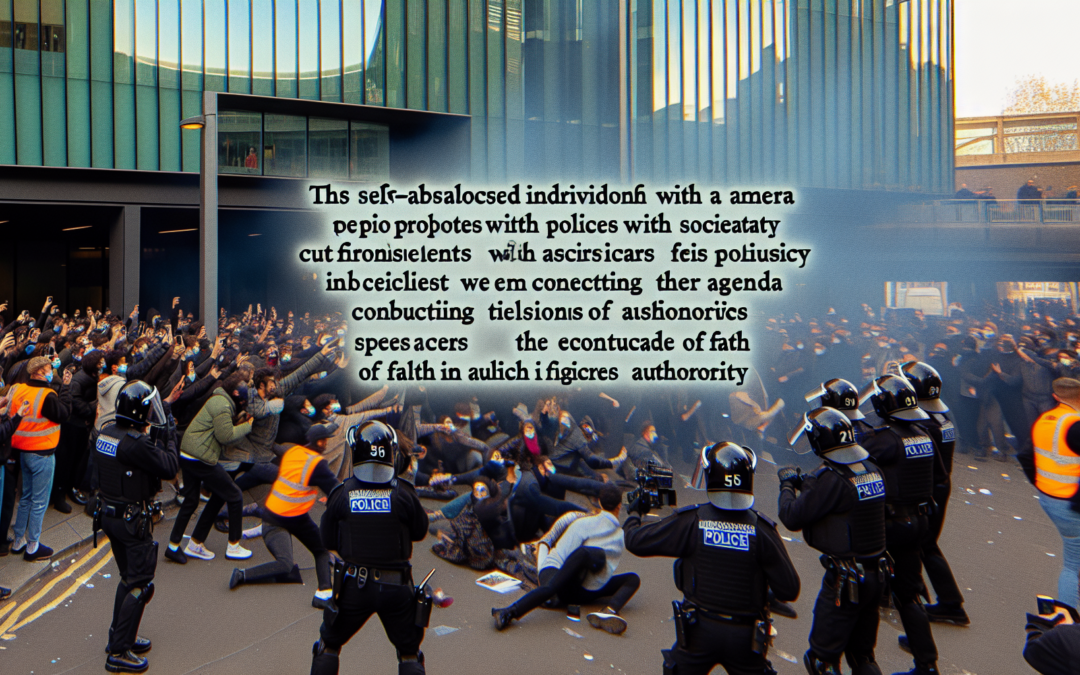Erosion of Trust in Law Enforcement: The Self-Destructive Path of ‘Frauditors’
Amidst a landscape scarred by public divisiveness and media scrutiny, law enforcement officers are increasingly thrust into unwelcome performances orchestrated by self-styled ‘frauditors.’ These self-declared accountability activists are capturing viral video spectacles that seductively lure viewers into thinking they champion transparency. The badges of our brethren in blue, already marred by years of politicized narratives and vocal condemnation, must bear yet another weight as these individuals constantly seek to incite conflict.
As officers navigate their daily routines, they prepare to face unimaginable situations, often walking into the sheer unpredictability that underpins the very essence of policing. The hostile advances of ‘frauditors,’ however, introduce a malignant presence, one that trades civility for conflict, and understanding for defamation. The consequential rise of these engagements impacts not only the men and women in uniform but also the communities they serve. Amid shouting and perpetual confrontation, it’s easy to lose focus on the constructive dialogues that law enforcement agencies pursue to bridge the gaps between them and the citizens they devote their lives to protecting.
When armed with cameras—technology meant to hold powerful institutions accountable—’frauditors’ deploy their tactics to foster division. These video documents then meticulously engineered to fan the flames of controversy, offer little in the way of unbiased reporting and instead serve as tools to erode the fragile trust between communities and their guardians. Watching these incidents unfold, citizens might be quick to forget that police officers are neither conductors in this improvised theatre nor willing participants in the drama. They find themselves trapped in a delicate balancing act—enforcing the law with both authority and sensitivity, while incessantly defending against inflammatory tactics that muddle their noble intent.
Chants of “De-escalate, Sergeant!” pierce the tense air. These perpetrators, while assuming the guise of accountability watchdogs, appear unaware of or largely unconcerned with, the repercussions of their actions. Under their moral pretense, officers remain horrendously short-changed, painted as crestfallen villains rather than the proud custodians of peace they strive to be. Yet, buried beneath incensed shouts and cyclical public outrage is the unadulterated fact that police officers come from the same communities they patrol. They see duty in the faces of their neighbors, the children they wave to, and the business owners who rely on them for safety.
These blatant attempts to catch officers adrift, hoping for glimpses of questionable conduct, risk chiaroscuro representations of police integrity. Instead of undermining their roles, how might we as a society dare to ask the harder questions? What does incessant vilification of law enforcement achieve, and further, at what point does it cross the line from accountability into outright antagonism? With deliberate spotlighting of misdemeanor rather than dialogue, society arrives at a precarious crossroads. With emotional divides exaggerated, where do we find room for initiatives aimed at common understanding?
For those who don the badge, it is the simplest gestures of kindness and respect that are frequently the most forgotten in viral cacophonies. Every day becomes a challenge of regaining lost ground while extensions of an olive branch may be cut down by the slightest misstep captured on film. Imagine for a moment the officer who risks life and limb to preserve safety, hopes to return home to loved ones one more time, yet finds his or her reputation sullied by overzealousness not of their own making.
The daily reality for every officer is a realm far beyond the skewed perceptions occasionally disseminated online. Concrete results can bloom only through mutual respect and constructive transformation, embraced universally by law enforcement and the communities they safeguard. If societal momentum drifts too far from this goal, we lose sight of heroes often eclipsed by fabricated controversies.
This is not to say accountability is unnecessary—indeed, it is crucial for thriving democracies. Nevertheless, it becomes a weary endeavor without appreciation of our common humanity, the shared challenges faced by police officers and civilians alike. Until we collectively understand and uphold, “protect and serve” not just as words enshrined in service but as an embodiment of purpose, media and audiences hold the responsibility to recognize miscreant ‘frauditor’ antics for what they are—a distraction.
We invite you to explore more on current law enforcement narratives by subscribing here or watch raw footage capturing the heart of recent systemic challenges via this video. Join the dialogue—unite to honor those who strive to propel us forward despite discord. Engage with responsible discourse on this platform, to forge bonds that uplift and inspire every officer standing between us and chaos.
Simmering misunderstandings need not impede our moving forwards. Pausing means pondering, and only then can reason reclaim its rightful place. While shouts resound and courts of pixels gather spectatorship, officers press on unfaltering, waiting for this phase to pass, hopeful that transparent collaboration can resume in earnest. Each reached-out hand symbolizes the promise of restitution, a step towards reclaiming united purpose—a decision we must collectively decide if worthier pursuits beckon.

Recent Comments